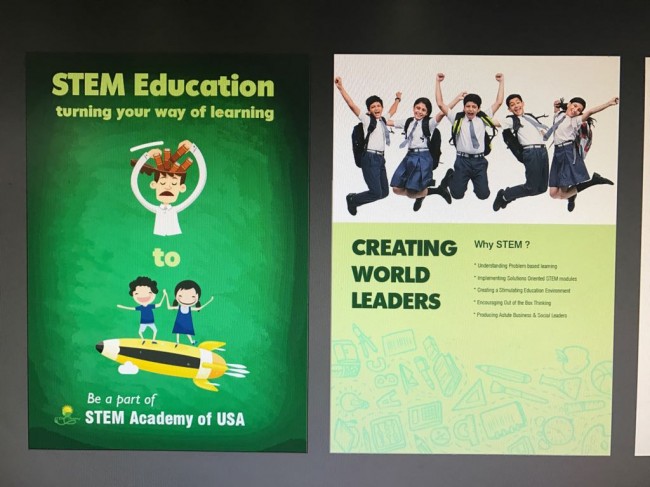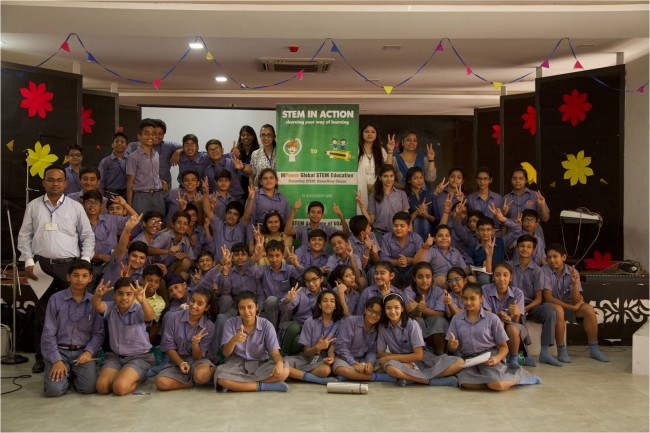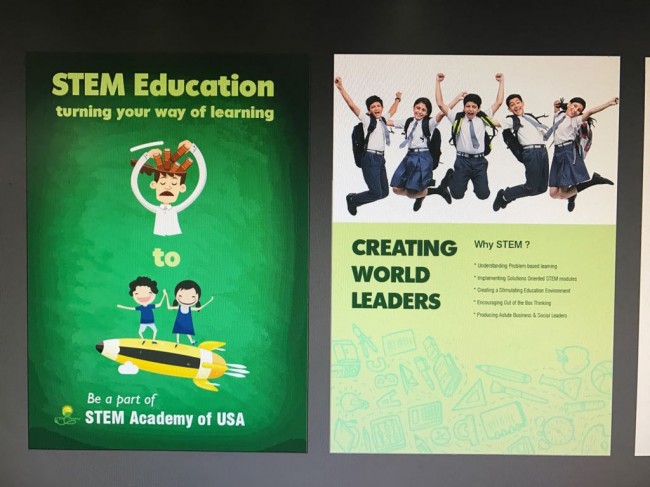Atlanta, GA, December 8, 2017: STEM Academy of USA, a US based premier organization founded by educationists Dr. Paddy Sharma and Dr. Amitabh Sharma is dedicated to changing the learning paradigm in Indian schools. The company is organizing a comprehensive STEM training program on Dec 17, 2017 for teachers in Delhi, Kolkata and Mumbai kicking off their Center of Excellence as a precursor to introducing STEM pilots and regular STEM programs in Indian schools. This high profile event is likely to be inaugurated by HRD Minister Hon. Prakash Javadekar.
STEM- Science, Technology, Engineering and Mathematics (STEM) is an interdisciplinary and integrated approach to learning. It is challenge based hands-on practical education which aims to foster inquiring minds, logical reasoning, and collaboration skills. STEM embodies the future innovative and creative geniuses of India. It is the need of the hour and is perfectly aligned with government propagated missions like Start-up India, Skilled India, Digital India, Make in India, New India. If successive US Presidents, Mr. Bush, Mr. Obama (his slogan ‘Educate to Innovate’), Mr. Trump have endorsed STEM for America’s creative uplift, India can certainly benefit from STEM based learning and generate innovative leaders.
STEM has come to assume great significance in view of re-igniting innovation and creativity amongst India’s school going children at the elementary, middle and high school levels. This methodology is increasingly finding more followers every day. Yet the efficacy of STEM based learning has by far been limited due to apparent lack of structure.
STEM Academy of USA has developed a unique implementation strategy for India. Over past several years, the company has led a pioneering effort in developing modular content along with practical tool-kits. All this in an endeavor to bring about positive transformation in Indian education landscape by introducing structured implementation of hands-on experiential STEM pedagogy for Grades 4 thru 10, knit as part of school time table and aligned to major boards that regulate primary and secondary school education in India
The company has had overwhelming response to several presentations and teacher trainings organized pan India to school owners, principals, managements, science and math teachers, students and parents. Now the company is embarking upon full-fledged STEM implementation in schools across India through their Gurgaon based Indian channel partner MPower Global- STEM Education where a dynamic marketing and sales team is led by V K Garg.
Background
India has traditionally been a country of abundant creativity. From the invention of zero and numeral system to complex hydraulic engineering, carburized steel, cotton textiles, radio/wireless communication, quantum statistics, lunar water (water on the moon) etc., India is credited for innumerable inventions that helped shape the world we live in today. While lately Indians have excelled in Information technology, yet the intensity of inventing talent has somehow been dormant few couple of centuries where Indians have proved wonderful emulators yet not innovative leaders. No wonder then the present focus is on harnessing the fertile minds and launching them into creative orbit.
The secret lies in catching them young. Human brains are most fertile in the formative years. In essence, therefore, the best results accrue out of learning programs introduced at elementary, middle and high school levels. Ironic that even though the education in the foundation age in India is strong, yet it is missing the innovative drive.
Montessori methodology
Maria Montessori, a noted Italian physician, propounded the theory that a child has innate traits to learn from the environment and tools around him. She went on to develop a spectrum of experiential kits for mixed age groups where peer to peer learning got accentuated. The books were replaced by hands-on practical projects which led to higher learning while teachers assumed the role of facilitators. Celebrity entrepreneurs and inventors like Jeff Bezos (Amazon), Larry Page & Sergey Brin (Google) and plethora of stalwarts swear by and attribute their creative instincts to hands-on challenge oriented Montessori education.
STEM- an extension of tried, tested and trusted methodology
STEM pedagogy is a natural corollary to Montessori’s do-it-yourself method of learning and it has proven to work towards elevating the understanding and application of knowledge. When a student explores a Math or Science concept through project based learning, it inseminates indelibly only to be gainfully applied in his future Engineering or Technological pursuit with an innovative flavor. This is the beauty of STEM- a process of self discovery triggered by inspiration fueled by inquiry.
The winning formula
So, while much has been talked and heard on STEM but its application has had very limited success primarily because it is bereft and devoid of structure. Several companies profess to have adopted STEM methodology but have failed to capture the pulse by virtue of sporadic introduction at best. STEM Academy has undertaken this onerous yet legacy creating mission to transform the education scenario by endearing structured STEM implementation. Over the past 4 years, critical thinking has led to STEM content development engaging subject matter experts from prestigious international universities and prime research organizations. Adequate traction has been registered in India through presentations, teacher training and establishing channel partners. As one of the important stakeholders, teacher training and certification in STEM pedagogy and delivery is seriously addressed because STEM certified teachers would be true ambassadors, champions and implementers of this unique offering.
Concept of Grade-wise STEM modules aligned to topics in syllabus
Subject matter experts have thus coined the safe path of connecting and relating STEM modules to specific science and math concepts in an inter-disciplinary fashion. While it is good, yet it still suffers from the versatility with which all concepts of certain grade level are purported to be explained. It depends primarily upon the exuberance and interest of one Principal or Director or even a teacher to first accept and later to find the required resources to implement STEM based curriculum.
The answer lies in structured approach to STEM as part of the regular school time table. The appropriate syllabus of each Grade level from Grade 4 thru Grade 10 is broken down into salient concepts which encompass the essence of that Grade. Then each concept has a challenge built around it. Such challenges are mapped to each concept and embody a problem and solution thereof. It is then the onus of students to first comprehend the challenge and seek to solve the problem by exercising creative talent. Class size is split into workable peer groups and carefully designed STEM tool kits assist students.
STEM Academy of USA – Fostering Innovative minds
STEM Academy of USA (SAUS) introduces middle and secondary school students (grades 4-10) to science, technology, engineering, and math (STEM) by immersing them in integrated, inter-disciplinary, hands-on challenges and projects that are based on problems of our present and future world. STEM modules encourage students to invent and be inspired. STEM courses are designed to have students solve real-world problems while being aligned to CBSE/ICSE/IB syllabus. The USP is the structured manner in which STEM courses are knit as part of year long school curriculum so as not to put extra burden on teachers vested with completing prescribed syllabus. They, in fact, help students to way better understand the concepts of Math and Science thus assisting teachers to reach their goals and preparing students to become problem solvers and creative out-of-the-box thinkers to boldly and successfully face and resolve constantly emerging global challenges. The course tends to break down the barriers between subject areas that are often present in a traditional school schedule.
Having mapped the 4 major syllabi in India- CBSE/ICSE/SSB/IB – for Grades 4 thru 10 into Math and Science modules, we have embarked upon a structured implementation of STEM as part of school curriculum. Each module dwells on an overarching Science and/or, Math concept and embodies several practical hands-on toolkits which help students to engage in project based interdisciplinary learning of Science and Math related with Engineering and technology principles. Each module is broken down into Blocks encompassing different facets of Math and Science concepts studies over 3-6 sessions depending upon grade level. The class size is split into comfortable group sizes of 5-6 students in each group and adequate number of modules are pre-loaded onto carts for each Class to come to STEM lab and do the learning. The content is constantly updated and maintenance rendered.
STEM training and certification is provided to Teachers through comprehensive workshops and constant orientation on pedagogy and delivery. Teacher training and certification in STEM is provided in Centers of Excellence operated by SAUS at various locations countrywide or at locations within schools that are desirous of conducting such training. Teacher’s role shifts to being a facilitator.
Salient unique features of STEM Academy of USA
*Structured STEM curriculum implemented as part of school timetable. *Content mapped to CBSE/ICSE/IB/SSB syllabus for Grades 4 thru 10. *Key concepts for each Grade addressed through easy-to-understand material. *Content and hands-on practical tool-kits developed by Subject matter experts based in US and India. *Pre and Post assessment- comprehensive analysis of improvement. *Proven to enhance performance in tests and competitive exams through better subject assimilation. *Collaborative discovery based peer-to-peer learning environment conducive to conceptual clarity. *Reduction in teacher workload due to supplemental role of STEM curriculum. *World class quality STEM content and tool-kits with constant updates. *Affordable price point per student per month basis convenient for school and parents. *Inclusive STEM training of teachers at Centers of Excellence in India. *Career boost for STEM trained teachers- preparing for tomorrow. *Student exchange programs between India and the USA. *STEM refresher courses and USA certification for teachers. *Participation of students in international STEM competitions and Olympiads. *Potential exposure to STEM opportunities at leading organizations like NASA, *Preferential consideration to job/profession oriented skill development programs. *Schools earn enviable reputation and popularity through better results and elevated education standards *Parents appreciate children becoming creative, innovative, original thinkers securing STEM careers
This sincere and tenacious attempt, therefore, to cause a resurgence of creative genius amongst Indian students could well result in cultivating the Aryabhattas of tomorrow.








